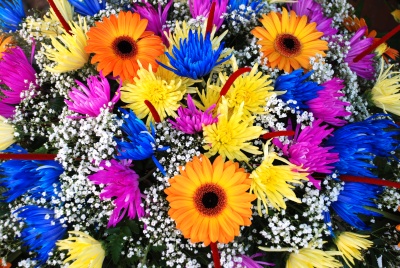Protecting Your Flowers from Diseases
Flowers are not immune from disease, and you should be prepared to take action to help your flowers if they fall prey to one of these diseases.
Flowers can be attacked by all sorts of things, like bacteria, viruses, and fungi.
Fungi can live dormant in the soil, even without plants, for quite a long time.
Even if you grow your flowers in an area that's been bare for a long time, fungi can still be there, waiting for you to plant something that it can attack.
So don't think starting with bare soil will protect your flowers.
Fungi are very difficult to kill, because they reproduce through spores that can spread very quickly.
A single plant infected with a fungus can spread up to 100 million spores!
Some fungi can enter a plan through the roots, and some enter through the leaves.
You need to work hard to get rid of a fungal infection completely so it won't return.
Bacteria can't live in bare soil for very long. They can't grow and multiply without moisture and warmth.
Bacterial infections are more prevalent in areas where the weather is warm and wet.
Bacteria is often spread through things like overhead watering that causes water to splash up onto plants.
Bacteria often get into a cut stem or leaf, so you should watch for damage to your plants.
Viruses can't multiply in the soil. They are only able to reproduce inside the cells of a plant.
They are usually transmitted by insects, or they can infect seeds or pollen that can be spread to other plants.
Viruses usually enter plants through cuts in the stems or leaves.
The most important thing to do to take care of your sick flowers is to properly diagnose the problem.
You can use books or online resources to attempt to identify any problems.
You'll really need to have some sort of resource available that can help you identify any problems, because you won't be able to properly treat your flowers if you don't know what's wrong with them.
You can also visit your local garden center or extension service to ask for advice.
If you aren't able to identify a problem on your own, you can visit one of these places to seek help.
You can simply describe your problem, but it would be best to take in pictures of the problem if you can.
Sometimes pictures can help much more than a description.
If possible, you should try treating your flowers with organic methods first.
Chemicals can sometimes damage your plants as much as the disease, and they're also very bad for the environment.
Don't automatically go for those fungicides and chemicals, because you can often treat your problems organically.
Some flowers are more delicate than others. Roses, for example, can be highly susceptible to a wide variety of problems.
Roses can get a problem called black spot, blistered leaves, and flowers that won't open due to bugs called thrips.
Be sure to know what problems your flowers can be susceptible to, so you'll already be prepared to take care of any problems by the time they occur.
Learn more here in our online Guide for Choosing the Right Type of Gardening for You and Your Home Garden.: Gardening Tips For Beginners.
You can also learn here about how to control pests in vegetable gardens to help you control the bugs and pests that will attack your gardening efforts.
P.S. Liked this how to do it guide? Be a sharer and spread the word on FaceBook or Twitter or G+.
And I'd love to hear your reviews or suggestions too! Just click the Comments link below and tell us your story - Thanks!
Join in and write your own page! It's easy to do. How? Simply click here to return to Gardening.

"Power Tips" magazine is back!
You Get A Free Complete Self Help Report delivered to your email box every edition, plus you get a free PLR article and other great gifts!
SUBSCRIBE BELOW ... I promise you will want to USE what you learn!
I really want to know what you think of this site, this page, and to hear your tips or suggestions about it.
So please share your story or simply add a Comment in the comment box.
If you feel that the information on this page has been useful to you please give it a Like or share it with your friends - thanks!!
"You are a life Saver!!
I recently discovered this site and I can tell you that my life has not been the same. I now come here EVERYDAY and spend at least 1 hour.
I used to spend that time browsing online fashion and beauty
magazine which just means that I spend more. Now I have replaced that
habit with coming here.
In future I will think about contributing articles as well. Thank you! Thank you!! Thank you!!! and God bless"
Contact Us | About Us | Terms of Use | Privacy Policy | FAQ | Testimonials
Amazon and the Amazon logo are trademarks of Amazon.com, Inc. or its affiliates. As an Amazon Associate I earn from qualifying purchases. Product prices and availability are accurate as of the date/time
indicated and are subject to change. Any price and availability
information displayed on [relevant Amazon Site(s), as applicable] at the
time of purchase will apply to the purchase of this product.
















